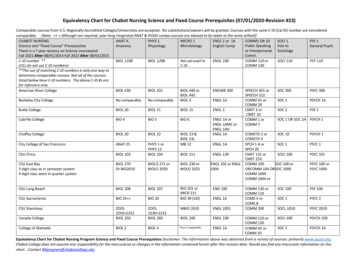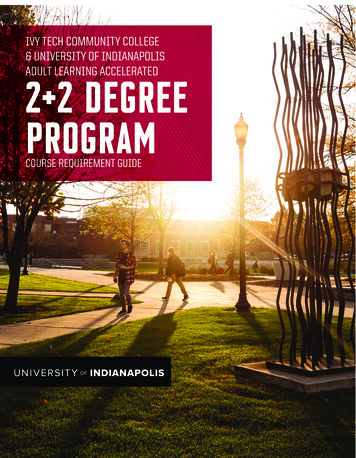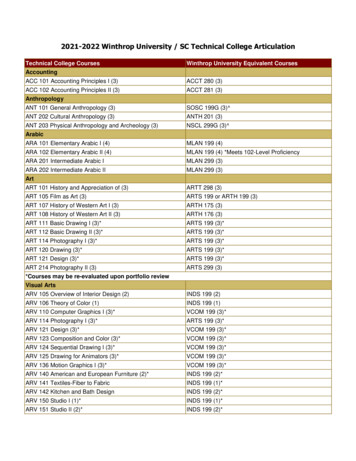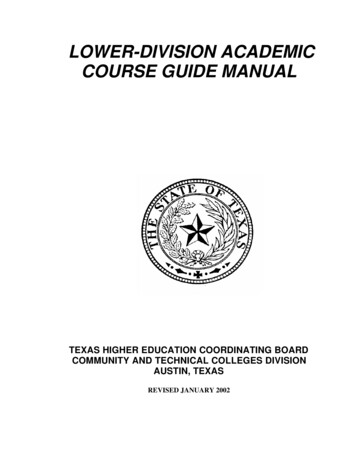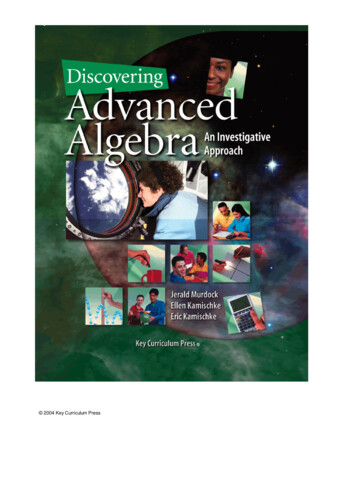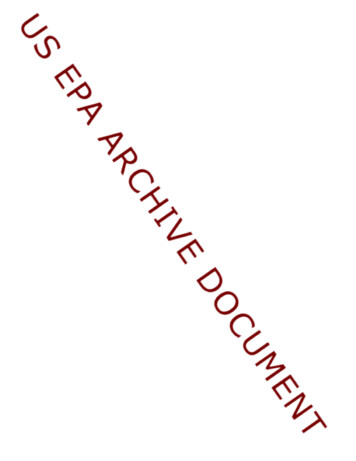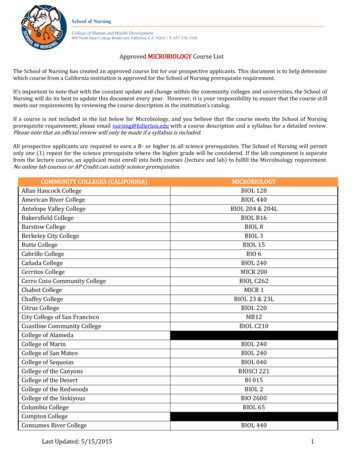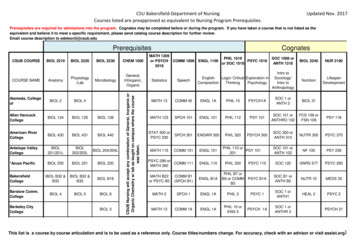
Transcription
BIOL*1070 Discovering BiodiversityWinter 2021Section(s): 01Department of Integrative BiologyCredit Weight: 0.50Version 1.00 - January 11, 20211 Course Details1.1 Calendar DescriptionThis course strongly emphasizes the development of learning and reasoning skills, anunderstanding of the nature of biological inquiry, and key concepts in evolution, ecology, andorganismal biology. These include the meaning and significance of biodiversity and currentissues surrounding it, the evolutionary processes through which biological diversity originatesand is interrelated, the complexity of organisms and the importance of physical organizationand regulatory processes, and the nature of interactions among organisms and betweenorganisms and their biotic and abiotic environments. Students lacking Grade 12 or 4U Biologyshould consult with their program counsellor prior to taking BIOL*1070 in first semester.1.2 Course DescriptionBIOL*1070 – Discovering Biodiversity strongly emphasizes learning and reasoning skills,biological inquiry, and key concepts in evolution, ecology, and organismal biology. Topicsdiscussed in the course include: the meaning and significance of biodiversity, current issuessurrounding biodiversity, the evolutionary processes through which biological diversityoriginates and is interrelated, the complexity of organisms, the importance of physicalorganization and regulatory processes, the nature of interactions among organisms, and thenature of interactions between organisms and their biotic and abiotic environments.This course complements the two other first-year biology courses, BIOL*1080 andBIOL*1090.1.3 TimetablePLEASE NOTE: ALL TIMES REPORTED ARE EASTERN TIME (GUELPH, ONTARIO, CANADA).
BIOL*1070 01 W21 v1.00Lectures: Begin Monday January 11, 2021 Live (synchronous) virtual lectures during scheduled lecture times on Mondayand Wednesday,Lecture Section 01: 10:30 AM - 11:20 AM, using Zoom.Lecture Section 02: 11:30 AM - 12:20 PM, using Zoom. Please make sure to attend the Zoom meeting for the lecture section that youhave registered for. After each lecture, a recording of the lecture will be posted to Courselink forasynchronous viewing by students.Seminars: Begin the week of Monday January 18th, 2021 (week 2) with a SYNCHRONOUSseminar (using Zoom) There will be 3 synchronous (live) seminars during the semester that will occurduring scheduled seminar times, using ZoomSeminar 1 (Week 2), Seminar 5 (Week 6), Seminar 9 (Week 10)Monday-Thursday, beginning at 10:30am-3:30pm; see WebAdvisor for yourspecific seminar section that you are registered in.Please ensure that you register for a seminar time that you are able toattend virtually when these synchronous seminars occur throughout thesemester. Asynchronous seminars will also occur throughout the semester (completed onyour own time)Seminar 2 (Week 3), Seminar 3 (Week 4), Seminar 4 (Week 5), Seminar 6(Week 7), Seminar 7 (Week 8), Seminar 8 (Week 9) There are no seminars scheduled during Weeks 11, and 12 Please see below section entitled "Seminars and their Content" for more details1.4 Final Exam Final exam date and time TBD. The final exam will be held during the final exam period but WILL NOT beadministered by the Registrar's office (so you won't see BIOL*1070 listed in thePage 2 of 22
BIOL*1070 01 W21 v1.00final exam schedule or a final exam listed in WebAdvisor). The final exam will be administered using Quizzes in Courselink.2 Instructional Support2.1 Instructional Support TeamInstructor:Email:Office:Shoshanah Jacobssjacob04@uoguelph.cavirtually, using Zoom Virtual student hours are Mondays andWednesdays: Courselink Chat: 10-10.30 and zoomclassroom 12.30-13.30.Office Hours:Instructor:Email:Office:Daniel Grunspandgrunspan@uoguelph.cavirtually, using ZoomOffice Hours: Virtual student hours are Mondays andWednesdays: Courselink Chat: 10-10.30 and zoomclassroom 12.30-13.30.3 Learning ResourcesTHIS COURSE DOES NOT HAVE REQUIRED TEXTBOOKSAny readings or materials that you will need will be provided to you in Courselink.However, all the information in any textbook is freely available using careful Google searches!We'll teach you how.If you do have a budget for books and would like to dive into something that supports yourlearning in any course while supporting the authors who write these important books, westrongly recommend:Kimmerer, R. (2013). Braiding sweetgrass: Indigenous Wisdom, Scientific Knowledge and theTeachings of Plants (First edition.). Milkweed Editions.Page 3 of 22
BIOL*1070 01 W21 v1.00If you do not have a budget for books, this book is available in online format through theUniversity of Guelph library. Check it out!3.1 Required ResourcesCourselink (Website) https://courselink.uoguelph.ca This course makes extensive use of Courselink, the University of Guelph’sonline learning environment. The course website will provide information andupdates about the course, including background information on the inquirycases, schedules, quizzes, discussions, and tracking of your progress.Zoom (Software)https://zoom.us Students registered in the course must register for a free basic Zoom accountin order to attend the synchronous Zoom meetings for lectures, seminars,virtual office hours, and virtual one-on-one meetings with students. Please visit https://zoom.us to register for a free basic Zoom account usingyour University of Guelph email address (Gryphmail).It is VERY IMPORTANT that you use your Gryphmail to register for youraccount and NOT any other email address (like a Gmail account) orFacebook.3.2 Recommended ResourcesMicrosoft Office - especially Word and Excel (Software) It is highly recommended that students have access to this software suite inorder to easily complete course assignments requiring word processing,spreadsheet, and data analysis capabilities. If students use other similar software, please ensure that you save your files inthe required file format according to the assignment instructions. As a student, you can download software FOR FREE from the University ofGuelph! Check out the CCS Website for more information.High speed internet connection (Equipment)Page 4 of 22
BIOL*1070 01 W21 v1.00 Although high speed connection to the internet is not required, it is highlyrecommended so that a better online experience with the tools, videos, andother materials used in the course can be achieved.4 Learning Outcomes4.1 Course Learning OutcomesBy the end of this course, you should be able to:1. Explain the central concepts of biodiversity, methods of analysis, and its ecological andsocietal importance.2. Develop accurate conceptions of evolutionary processes and patterns (especially naturalselection and “tree thinking”), and to correct common misconceptions about evolution.3. Construct a conceptual framework that explains some of the causes and consequencesof forest diversity.4. Describe the interactions between organisms and their biotic and abiotic environmentsand be able to apply these concepts to real-world examples.5. Organize and analyze data that characterize biological variation, patterns andrelationships.6. Interpret complex graphs and figures and be able to choose appropriate graphs andfigures to illustrate different types of data.7. Practice the process of biological inquiry using scientific methods and reasoning usingreal examples.8. Appreciate the integrative nature of modern biological science.9. Develop a level of comfort with the complexity and uncertainty inherent in biologicalscience.5 Teaching and Learning ActivitiesThe course will focus primarily on skills development and the process of inquiry entrenchedwithin the meaning, significance, and current issues surrounding biodiversity. These will beunderpinned by core concepts in the topics of evolution, ecology and physiology that will beintroduced and reinforced throughout the course.Skills:Page 5 of 22
BIOL*1070 01 W21 v1.001. To develop capabilities for independent study and research.2. To develop the ability to assess and analyze biological information.3. To reinforce numeracy skills by developing a broader knowledge base of dataspreadsheets, statistical analyses and data presentation.4. To understand and practice the process of biological inquiry using scientificmethods and reasoning.5. To develop skills for working in groups cooperatively and efficiently.6. To develop effective communication skills.5.1 ConceptsEvolution:1. The processes by which biodiversity originates and is interrelated (evolution, withemphasis on natural selection and “tree thinking”).2. Variability occurs at multiple levels: variation (population) vs. diversity (species)and may be visible (phenotypic) or not necessarily visible (genetic).3. Causes and consequences of variation at population & species level.4. The factors determining, relatedness and phylogeny, genetic isolation.5. Adaptation and the pros/cons of specialization, invasions and radiations.6. Consequences for competition (short-term, among conspecifics or betweenspecies), speciation (long-term), and extinction risk (long-term).Ecology:1. The nature of interactions among organisms and between organisms and theirbiotic and abiotic environments at the ecological scale.2. Variability is expressed at different levels of organization (ecosystems,populations/species, and individuals).3. Causes of diversity at each level can be understood by studying the processesoperating in the levels below; the consequences of diversity can be examined asPage 6 of 22
BIOL*1070 01 W21 v1.00they affect diversity in the levels above.4. Ecosystem diversity is known to vary both in space and time. Historicalprocesses affect the dynamics of species diversity.5. Understanding the complexity of variables associated with the causes andconsequences of diversity.6. Uncertainty in current dogma and the putative effects of anthropogenic change.Physiology:1. The complexity of organisms and the importance of physical organization andregulatory processes (e.g., information flow, structure/function, development).2. Changes in the external environment impacts organisms. Organisms i) exchangemolecules with the external environment, ii) regulate internal environment(homeostasis) through feedback mechanisms, iii) regulate, others conform tospecific environmental parameters.3. Organisms are organized in a hierarchy from cells to tissues to organs to organsystems. Structural features at all levels of organization have functionalsignificance.4. Plants respond to environment changes; circadian rhythms, dormancy,temperature stress.5. Animals respond to temperature changes differently depending on their thermalgroup (endothermy, ectothermy): methods of heat transfer; metabolic ratechanges with animal size, activity, temperature; strategies to cope with extremecold in ectotherms and endotherms; time frame of responses (acute, chronic,evolutionary time).6. Impacts of climate change in arctic organisms include factors such asphysiological change, geographic range and ecosystem disruption.5.2 Virtual Lectures and their ContentPLEASE NOTE: ALL TIMES REPORTED ARE EASTERN TIME (GUELPH, ONTARIO, CANADA). Two 50-minute virtual interactions per week with two Professors, using Zoom. Realtime closed captioning of these lectures will be provided to students.Lecture Section 01: 10:30 AM - 11:20 AM on Monday and WednesdayLecture Section 02: 11:30 AM - 12:20 PM on Monday and WednesdayPage 7 of 22
BIOL*1070 01 W21 v1.00 These virtual interactions will focus on discussion and application of the onlinereadings on the topics of Evolution, Ecology, and Physiology that explore bothskills and major concepts. The first topic: Evolution, will use a case study entitled “Invasion! Mussels of theGreat Lakes Regions”, that is based on a serious and current concern about lossof biodiversity in mussel species in the Great Lakes and watersheds. Keyconcepts in evolution will be discussed in the context of an urgent biological,environmental and societal issue in Ontario. The second topic: Ecology, will use a case study entitled “Forest Biodiversity”, thatis based on controversial issues surrounding species diversity in forests andconservation biology. Key concepts in evolution and ecology will be discussedwithin the framework of current ideas about forests. The third topic: Physiology, will use a case study entitled “An Arctic Ecosystem 8 C Warmer”, that concerns climate change and the impact on arctic organisms.Key concepts in evolution, ecology, and physiology will be integrated into adiscussion of the impact of temperature change in the short and long-term onindividuals, populations and the ecosystem.5.3 Seminars and their ContentPLEASE NOTE: ALL TIMES REPORTED ARE EASTERN TIME (GUELPH, ONTARIO, CANADA).Virtual, synchronous seminars during scheduled seminar times These synchronous seminars will occur during Seminar 1 (Week 2), Seminar 5(Week 6), and Seminar 9 (Week 10) Synchronous seminars will be conducted using Zoom. Students must register for a seminar section that they are able to attend virtually. Students will meet with a graduate student Teaching Assistant (GTA) and thesame group of 30 students. Students will be organized into groups of3 students for activities and discussions during these seminars and these groupswill work on group assignments in seminar together as well as a groupassignment (the Interdisciplinary assignment). TAs will take students through the process of scientific inquiry, using adigital forest as a model for inquiry.Page 8 of 22
BIOL*1070 01 W21 v1.00Asynchronous seminars: Can be completed by students on their own time, while ensuring to complete theseminar and hand in associated assignment by the due date. These asynchronous seminars will occur during Seminar 2 (Week 3), Seminar 3(Week 4), Seminar 4 (Week 5), Seminar 6 (Week 7), Seminar 7 (Week 8), Seminar8 (Week 9) These seminars will emphasize skills development associated with scientificinquiry, such as using Excel software for data management and analysis, as wellas scientific writing skills.There are no seminars scheduled during Weeks 11, 126 Assessments6.1 Marking Schemes & DistributionsNameScheme A (%)Reading Quizzes (11 at 0.5% with lowest quiz mark dropped)5Seminar Assignments (lowest mark of these Assignments dropped)15Midterm #1: Evolution15Midterm #2: Ecology15Effect of Pesticide Project (EPP)20Interdisciplinary Assignment (IA)10Final Examination20Total1006.2 Assessment DetailsReading Quizzes (11 at 0.5% with lowest quiz mark dropped) (5%)Date: Throughout the semester, OnlineLearning Outcome: 1, 2, 3, 4, 5, 6, 7, 8, 9Page 9 of 22
BIOL*1070 01 W21 v1.00 Reading quizzes will test student knowledge of online readings in the topics ofEvolution, Ecology, and Physiology.Each topic is presented in parts: Evolution - 3 parts, Ecology - 4 parts,Physiology - 4 parts, with an associated reading quiz for each part ofeach topic (total of 11 quizzes) Students will read the assigned reading for each week (in Content inCourselink) and complete the associated quiz in Courselink prior to lecture onMondays. Quizzes have a deadline of Mondays at 9:30 AM Eastern Time. Please see the Course Schedule posted in Courselink for further details.Seminar Assignments (lowest mark of these Assignments dropped) (15%)Due: Throughout the semester, OnlineLearning Outcome: 3, 4, 5, 7, 9 Various topics and skills will be assessed. Assignments associated with Asynchronous seminars are completedindividually and are due on Fridays at 10:00 PM Eastern Time. Assignmentswill be submitted online for grading (to Dropbox). The assignment associated with seminar 5 (synchronous seminar) iscompleted in seminar groups and is due at the end of your seminar. Thisassignment will be submitted online for grading (to Dropbox). Please see the Course Schedule posted in Courselink for more detail onseminar assignments.Midterm #1: Evolution (15%)Date: Friday February 5th, Online - Courselink QuizzesLearning Outcome: 1, 2 This first midterm will cover the online readings and lectures associated withTopic #1 - Evolution This midterm will be administered through Quizzes in Courselink. Please see the course schedule for more details. More details regarding the midterm will also be discussed with students closerto the midterm.Midterm #2: Ecology (15%)Date: Friday March 12th, Online - Courselink QuizzesLearning Outcome: 1, 3, 4, 6Page 10 of 22
BIOL*1070 01 W21 v1.00 This second midterm will cover the online readings and lectures associatedwith Topic #2 - Ecology This midterm will be administered through Quizzes in Courselink. More details regarding the midterm will be discussed with students closer tothe midterm.Effect of Pesticide Project (EPP) (20%)Due: Friday March 26th, 10:00 PM, Online - DropboxLearning Outcome: 1, 3, 4, 7, 8, 9 Students will apply the skills associated with scientific inquiry, numeracy, andscientific writing gained throughout the semester during seminar to completethis assignment. Students will collect data in the digital forest, compile this data and analyze it. Students will create figures to visually display the data (including figurecaptions), and write an abstract summarizing the findings of their scientificinquiry. This is an individual assignment.Interdisciplinary Assignment (IA) (10%)Date: Friday April 9th, 10:00 PM, Online - DropboxLearning Outcome: 1, 6, 8, 9 This assignment emphasizes integrative thinking in the 3 topics of the course:evolution, ecology & physiology. This is a group assignment. Students will work with their seminar group members to create an infographicbased on the results of the Effect of Pesticide Project (EPP) that addresses the3 topics central to the course.Final Examination (20%)Date: TBD - During the final exam period, Online - Courselink Quizzes The final exam will cover the online readings and lectures associatedwith Topic # 3 - Physiology. Details about the final exam for this course will not appear in WebAdvisor or inthe Final Exam schedule released by the Registrar's office. More details regarding the final exam will be discussed with students closer toPage 11 of 22
BIOL*1070 01 W21 v1.00the final exam.6.3 Consideration for Time Zone Assignment due dates and times reported in this course outline and in Courselink arein Eastern Time (Guelph, Ontario, Canada). Please ensure that when completing course assignments that the assignmentsare submitted by the due date and time as indicated in the course schedule.7 Course Statements7.1 Draft Course Outline Disclaimer This is a draft course outline and is subject to change up to the first day ofclasses, in keeping with the policy described in the University of Guelph AcademicCalendar. Please see the final version of the course outline within the Content of theBIOL*1070 Courselink Site on the first day of semester.7.2 BIOL*1070 Honour Code of ConductTo ensure fairness and integrity, all students participating in this remote online course mustagree to abide by the following code of conduct:1. My answers will be my own work.2. I will not make answers available to anyone else. This includes both answerswritten by me, as well as any official answer keys provided by the courseinstructors, coordinator, or Teaching Assistants.3. I will not engage in any other activities that will dishonestly improve my results ordishonestly improve or hurt the results of others.It’s simple; it’s straightforward: please behave honourably, appropriately, and withacademic integrity (regardless of the course being held online).By enrolling and participating in this course, you agree to follow the above honour code ofconduct.Page 12 of 22
BIOL*1070 01 W21 v1.00Please see the Academic Integrity Statement in this course outline, as well as visit theBiological Science Code of Conduct, Academic Integrity and Learning Outcomes Coursein Courselink. Students are automatically registered in this Course in Courselink. Simply click on the 'Resources' Tab in 'My Courses' on your Courselink LandingPage when you log into Courselink.7.3 Consideration of Time ZonesPLEASE NOTE: ALL TIMES REPORTED IN THIS COURSE OUTLINE AND IN COURSELINK AREEASTERN TIME (GUELPH, ONTARIO, CANADA)If you are joining us from another time zone, please ensure that you take into account thetime change when registering for your seminar section, when submitting assignments, andwhen completing the midterms and final exam. There are 3 seminars in the course that students must attend live(synchronously). Students are also strongly encouraged to attend the synchronous lectures heldon Mondays and Wednesdays7.4 Grading PoliciesReading quizzes Students will be introduced to online topic readings and related informationonline. Students will test their knowledge and understanding of the key concepts andterminology in the online readings in these weekly reading quizzes. Quizzes that are submitted late will be given a mark of zero. At the end of the term we will drop your lowest quiz mark on these quizzes andnot include it in your final grade.Seminar AssignmentsPage 13 of 22
BIOL*1070 01 W21 v1.00 Students will explore the process of biological inquiry through directed seminaractivities. In seminars, students will use various methods to identify organisms, discussconcepts and approaches to testing hypotheses, measure biological samples,collect and analyze data. Seminar assignments will primarily be completed individually (asynchronousseminars). There is one seminar assignment to be completed in groups(synchronous seminar 5). The assignments associated with asynchronous seminars are due on Fridays at10:00 PM in Dropbox. The assignment associated with synchronous seminar 5 will be due at the end ofyour scheduled seminar to Dropbox. Only 1 assignment per group will need to besubmitted. At the end of the term we will drop your lowest seminar assignment mark and notinclude it in your final grade.Midterms (#1: Evolution, #2: Ecology) Midterm exams will be conducted using Quizzes in Courselink. These exams will consist of written answer questions that focus on concepts andskills related to the first two topics of the course (Evolution and Ecology). Further details regarding these midterms will be discussed with students closerto each midterm.Effect of Pesticide Project (EPP) Students will explore the process of biological inquiry through this digital fieldproject focused on assessing the effect of pesticide use on an insect population. Students will collect data in the digital forest, analyze this data, and create figures(with figure captions) to visually represent the data. Students will also write anabstract to report their findings. This assignment is completed and submitted individually by students.Page 14 of 22
BIOL*1070 01 W21 v1.00Interdisciplinary Assignment (IA) This assignment is a group assignment. Students will work in their seminar groupsto create an infographic based on the results of the EPP and will address the 3different topics in the course (Ecology, Evolution, and Physiology).Final Exam The final exam will be held outside of class during the final exam period The final exam will be administered using Quizzes in Courselink. This 2 hour exam will consist of written answer questions that focus on Topic #3of the course (Physiology) as well as application of concepts from the entiresemester to novel biological examples.7.5 Expectations & GradingBIOL*1070 has a 0.5 credit weight. At the University of Guelph, this translates to anexpectation of 10-12 hours of deliberate and productive work per week graduate/current/c08/c08aload.shtml). If you notice that you are not fulfilling this expectation, please meet with yourinstructors to discuss strategies.We expect you to become familiar with the University of Guelph grading policy graduate/2016-2017/c08/c08grds-proc.shtml).Here it is clearly stated what the expectations are in accordance with each letter grade. Forexample, an assignment evaluated at 80% or higher has the following attributes:80 - 100 (A) Excellent. An outstanding performance in which the studentdemonstrates a superior grasp of the subject matter, and an ability to gobeyond the given material in a critical and constructive manner. The studentdemonstrates a high degree of creative and/or logical thinking, a superiorability to organize, to analyze, and to integrate ideas, and a thorough familiaritywith the appropriate literature and techniques.Page 15 of 22
BIOL*1070 01 W21 v1.00If you find yourself at risk of not achieving your goals, please make sure that youseek help from any of your instructors. If you are prepared to the make the effort, wewill be delighted to help you.7.6 Group Work Seminar groups of 3 students will be pre-determined and these groups willcomplete the following assignments together.Seminar 5 assignment (synchronous)The Interdisciplinary Assignment (IA) Only one seminar 5 assignment and one IA need to be submitted for each group tothe appropriate dropbox. All group members will receive the same grade on these assignments.7.7 Recording of Lectures and SeminarsThe University of Guelph’s primary mode of course delivery has shifted from face-to-faceinstruction to remote and online learning due to the ongoing COVID-19 pandemic. As a result,some learning activities (e.g., synchronous lectures and seminars) may be recorded byfaculty, instructors and TAs and posted to CourseLink. As a result, students may be recordedduring these sessions.By enrolling in BIOL*1070, unless explicitly stated and brought forward to their instructor, it isassumed that students agree to the possibility of being recorded during “live” (synchronous)course activities such as lecture and seminar.If a student prefers not to be distinguishable during a recording, they may:1. turn off their camera2. mute their microphone3. edit their name (e.g., initials only) upon entry to each session4. use the chat function to pose questions.Students who express to their instructor that they, or a reference to their name or person, doPage 16 of 22
BIOL*1070 01 W21 v1.00not wish to be recorded may discuss possible alternatives or accommodations with theirinstructor.Furthermore, Instructors will be recording their Zoom lectures and posting to Courselinkfollowing each lecture.Lectures will be closed captioned for students. Seminars may be recorded but will not be shared with students in Courselink. Electronic recording of lectures or seminars by students is expressly forbiddenwithout consent of the instructors. When recordings are permitted they are solelyfor the use of the authorized student and may not be reproduced, or transmittedto others, without the express written consent of the instructors.7.8 In case of Zoom Service Disruption If Zoom crashes at any point during the course, students will receive an email (totheir Gryphmail) within 5 minutes of the crash This email will provide details how the situation will be handled.7.9 Online Behaviour - NetiquetteInappropriate online behaviour will not be tolerated. Examples of inappropriate onlinebehaviour include: Posting inflammatory messages about your instructor or fellow studentsUsing obscene or offensive language onlineCopying or presenting someone else's work as your ownAdapting information from the Internet without using proper citations orreferences Buying or selling term papers or assignments Posting or selling course materials to course notes websites Having someone else complete your quiz or completing a quiz for/with anotherstudentPage 17 of 22
BIOL*1070 01 W21 v1.00 Stating false claims about lost quiz answers or other assignment submissionsThreatening or harassing a student or instructor onlineDiscriminating against fellow students, instructors and/or TAsUsing the course website to promote profit-driven products or servicesAttempting to compromise the security or functionality of the learningmanagement system Sharing your user name and password Recording lectures without the permission of the instructor7.10 NO required textbooks - all readings and materials will be inCourselinkThis course has no required textbooks. All the information in any textbook is freely availableusing careful Google searches! We'll teach you how.If you do have a budget for books and would like to dive into something that supports yourlearning in any course while supporting the authors who write these important books, westrongly recommend:Kimmerer, R. (2013). Braiding sweetgrass: Indigenous Wisdom, Scientific Knowledgeand the Teachings of Plants (First edition.). Milkweed Editions.If you do not have a budget for books, this book is available in online format throughthe University of Guelph library. Check it out!In addition, all readings, dichotomous keys and other materials you will need will be oncourselink for you and/or available through Course Reserves (ARES) through theUniversity of Guelph library.7.11 Collection of Information for Academic PurposesUse of personal information:Personal information is used by University officials in order to carry out their authorizedacademic and administrative responsibilities and also to establish a relationship for alumniand development purposes. The University of Guelph’s policy on the Collection, Use andDisclosure of Personal Information can be found in the Undergraduate ars/undergraduate/current/intro/index.shtml)Page 18 of 22
BIOL*1070 01 W21 v1.008 Department of Integrative Biology Statements8.1 Academic AdvisorsIf you are concerned about any aspect of your academic program: Make an appointment with a program counsellor in your degree program. B.Sc.Academic Advising or Program Counsellors8.2 Academic SupportIf you are struggling to succeed academically: Learning Commons: There are numerous acad
Braiding sweetgrass: Indigenous Wisdom, Scientific Knowledge and the Teachings of Plants (First edition.). Milkweed Editions. Page 3 of22. BIOL*1070 01 W21 v1.00 If you do not have a budget for books, this book is available in online format through the University of Guelph library. Check it out!
